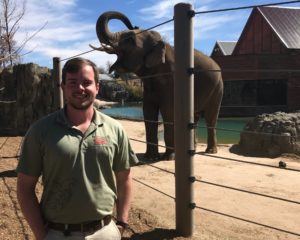
Professional science master’s student Carson Jones with Bodhi, one of three elephants at Denver Zoo’s Toyota Elephant Passage. |
Many people don’t know what they want to be when they grow up. Others, like Carson Jones, have always known.
“My parents would tell you I’ve wanted to be a zookeeper since I was about 2 years old,” the Alabama native says. “I’ve been on this path for a while.”
That lifelong ambition has led Jones to Colorado State University’s two-year Professional Science Master’s program in zoo, aquarium and shelter management, where he’s about to finish up his first year. The 5-year-old program, coordinated by animal behavior researcher Jennie Willis, blends business skills and applied science with a specific focus on animal organizations.
As part of his master’s work, Jones has also gotten a once-in-a-lifetime opportunity: an internship working at Denver Zoo’s Toyota Elephant Passage, where three Asian male elephants named Bodhi, Billy and Groucho reside.
Elephant behavior
Between juggling his own classwork and teaching a section of freshman biology lab, Jones drives to Denver three days a week to be with the elephants. Beyond his regular duties assisting in day-to-day maintenance of the exhibit, Jones is also partaking in an observational study of elephant behavior using high-definition cameras and a behavioral ethogram.
Eight times per shift, Jones sits with the camera and observes the elephants, recording how many times he sees certain behaviors.
The Toyota Elephant Passage is one of the few exhibits in the nation that houses only bull (male) elephants – traditionally, zoos have kept mostly female elephants because males tend to be larger, more destructive, and more difficult to care for. However, according to Jones, in the wild male elephants sometimes form “loose bachelor herds” that the zoo has attempted to recreate in the exhibit.
It was destiny
You could say zoo work is Jones’ destiny. For 10 straight years as a child, he attended zoo camp. At age 13, he began volunteering at the Birmingham Zoo, near his hometown. Over ensuing years, he logged close to 6,000 volunteer hours there, as well as several paid positions. He’s interned at the Australia Zoo (home of the late Crocodile Hunter, Steve Irwin).
“I love working with the elephants, and I am lucky enough to have the opportunity to get involved with the [Denver Zoo] program. But I have done a little bit of everything: cats, primates, birds, reptiles, giraffes, zebras – you name it, I’ve worked with them.” If he had to pick, he’d name orangutans, big cats and elephants among his top three favorites.
After getting his bachelor’s in animal science from University of Georgia, Jones discovered CSU’s professional zoo program, and knew it was the next step for him. “I love what I do, but I want to move up and have a voice in the larger picture of zoo management,” Jones said.
Spreading the love about zoos
Jones is passionate about zookeeping and also about clearing up misconceptions around what zoos are.
“People tend to feel strongly about zoos – they either support them or they don’t support them,” Jones said. Some people believe zoos exist only for human entertainment or personal pleasure, and there was a time when that was true.
“All industries grow and change over time as we learn more about these animals. Today’s zoos are all about connecting people with animals and the natural world, ideally inspiring conservation awareness and action,” he said.
As for what zookeepers do every day, Jones said, some people think “we just play with animals all day.”
Actually, caring for zoo animals is “a lot of cleaning, and a lot of diet preparation,” he said. He also enjoys engaging with zoo visitors, sharing about the animals and about conservation. “I like getting on the microphone and talking to people,” he said.
As much as he loves working with animals, Jones wants to aim for management positions to help lead organizations that engage in research-based practices around animal conservation. And he thinks CSU’s program will help him get there.
And for others wanting to become zookeepers? A little advice: “These jobs are competitive. If you’re not willing to try something new, or you’re not willing to move around, you’re not going to get a job.”
Story originally posted on SOURCE: http://source.colostate.edu/zookeeping-destiny-carson-jones/
